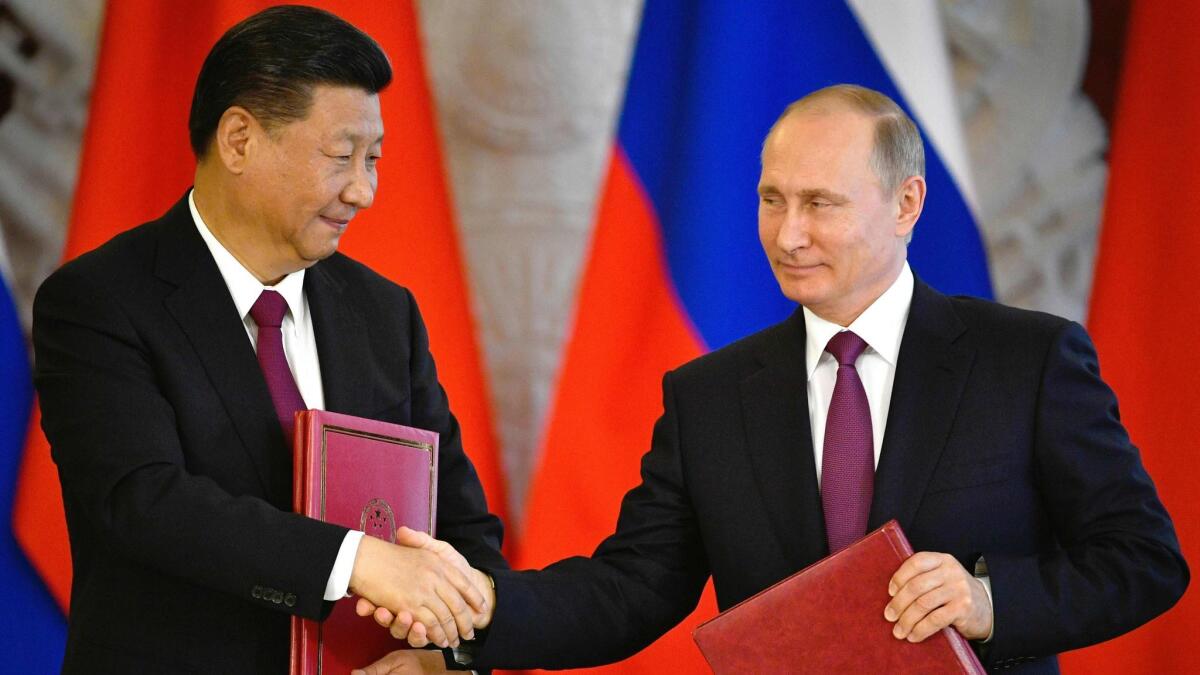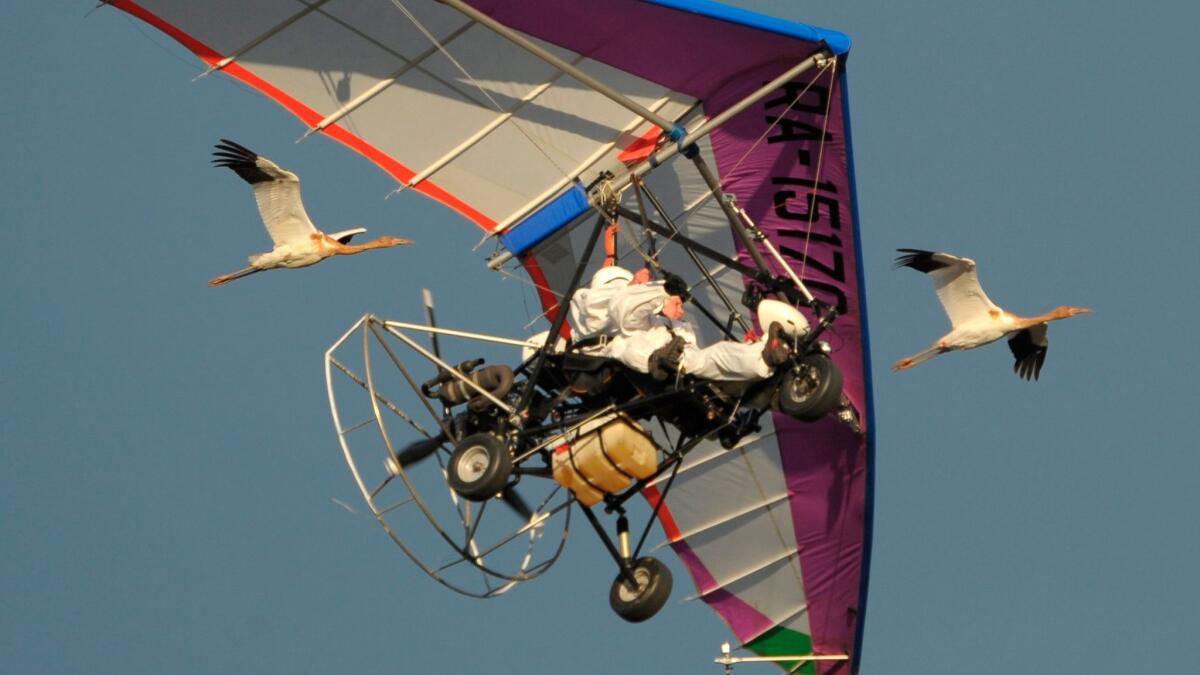Presidents for life? A conversation about Xi Jinping and Vladimir Putin

When China’s Communist Party proposed amending the constitution to eliminate presidential term limits, allowing President Xi Jinping to rule for the foreseeable future, two names consistently came up among China-watchers searching for comparisons.
One was predictable enough: Mao Tse-tung, whose iron-fisted leadership in the 1950s through ’70s led to the deaths of millions.
The other was Russia’s Vladimir Putin, who has found a way around Russia’s term limits and will be elected — there is no doubt — to another six-year term later this month.
Parallels between Putin and Xi are undeniable. Both project images of strength and stability. Both are avowed nationalists with territorial ambitions (Putin in Ukraine; Xi in the South China Sea). Both gained power not through war or coup, but through patient, skilled political maneuvering.
Yet the comparison is imperfect.
The Times’ Moscow-based reporter, Sabra Ayres, and Beijing bureau chief Jonathan Kaiman recently discussed how differences between the men — and the societies they’ve shaped in their image — shed light on the spectrum of authoritarianism, the legacy of communism, and ultimately, the fate of the world. Here is their conversation:
Jonathan Kaiman: Sabra, are people in Russia paying attention to the news about Xi? If so, what do they think about it?
Sabra Ayres: I would say that the average Russians — I mean the man on the street or one of my Russian friends — aren’t paying much attention to Xi or China in general. That’s particularly true here in Moscow and the European parts of Russia. Russians in the Far East think a lot more about China, because their local economies are closely linked to trade and labor opportunities. Otherwise, what happens in China is generally seen as Beijing’s “internal affairs” — a common phrase repeated on Russian state television about any country and used by the Kremlin to remind people that it’s the West, not Russia, that meddles in other countries’ domestic politics.
The news about China’s constitutional change was covered by the state media here, but only in the sense that it was an event that happened. The Russian television news, where most Russians still get their information, is dominated by anti-American themes. You can see how this plays out: A December 2017 public opinion survey conducted by the Levada Center here in Moscow asked respondents to name Russia’s biggest enemy. Sixty-eight percent said it was the U.S., while only 2% said China.
In 2008, Putin skirted around the consecutive, two-term presidential limit by becoming prime minister under President Dmitry Medvedev. That same year, Russia amended its constitution to extend the presidential term from four to six years. Putin then returned to power in 2012. He’s now up for reelection on March 18. No one doubts he will win his fourth term and remain in power until 2024.
Are the Chinese following news about Russia’s election on March 18? Putin’s approval ratings are 80% here. What do the Chinese think about him?
JK: Putin is well-liked in China. Many Chinese equate Russians with toughness and bravado — some internet users call them “the warrior race” — and they see Putin as deserving of his perch. Putin will win next month “unless Mars hits Earth during the election,” said a user of zhihu.com, China’s version of Quora. Many social media users extol his tough-guy image, whether it’s him playing a Soviet folk song on the piano while visiting China last spring, riding horses shirtless, or flying with rare cranes. Xi is more aloof. His name and official portrait — half-smiling, eyes soft, skin unblemished — adorn billboards and book covers, projecting an image of benevolent authority. Xi is not one to fly with cranes.

What Chinese internet users rarely talk about is Putin’s legacy of repression. Chinese authorities restrict public criticism of, well, authoritarianism, and any jabs at Putin’s hard-line policies — or his alleged corruption — might edge too close to the line.
How repressive is Putin’s Russia, really? What are the “red lines” for dissent?
SA: When it comes to politics in Russia, there’s not much room for maneuvering around Putin’s managed democracy. Technically, there are eight candidates running for president on March 18. Putin is of course among them. But in reality, there’s really only one candidate, with a few side characters generally assumed to be approved by the Kremlin to make it look like a legitimate election.
In Russia, you don’t want to be seen as part of what Putin has called “the fifth column” — nongovernmental organizations cooperating with foreign donors, human rights activists, opposition leaders or outspoken journalists. To the Kremlin, these are the groups that are trying to destroy Russia from within.
There’s also a new red line that was drawn after the Crimean annexation in 2014: being unpatriotic. Putin once called the breakup of the Soviet Union the “greatest geopolitical catastrophe of the 20th century.” Russians saw Putin taking back Crimea as restoring Russia to greatness. The Kremlin encouraged that image, and discourages bringing up some of Russia’s most difficult moments in history, such as Stalin’s political repressions. Those who have pointed out Russian faults or mistakes have landed in jail, even for something as simple as linking a post on social media that criticized Russian involvement in the war in eastern Ukraine.
One of the ways Putin has managed to remain so popular is that he has perpetuated the idea that Russia is a fortress under siege from the West, most notably America — from the Olympics ban to the “Russophobia” growing in Washington.
Does this sound similar to the situation in China?
JK: Xi truly believes in the Chinese Communist Party, and, like Putin, appears to believe liberal democracy has no place in his country’s political life. He has overseen China’s worst tightening of public expression since the early 1990s, with crackdowns on human rights lawyers, journalists, universities, religion, the internet, virtually all potential bastions of free thought. Most prominent Chinese dissidents are in jail, or exile, or under crushing surveillance. The term limit’s abolition “signals the likelihood of another long period of severe repression,” Jerome Cohen, a professor at New York University and expert in Chinese law, wrote in a blog post.
The move also precipitated its own rash of censored topics — on Weibo, China’s version of Twitter, forbidden terms include “reelection,” “proclaiming oneself an emperor,” and “I don’t agree.” Censors have even blocked images of Winnie the Pooh, whose rotund frame and bemused expression have reminded countless web users of their leader.
SA: What does Xi’s move to potentially stay in power indefinitely mean for the U.S.?
JK: U.S. policymakers are probably concerned that the world’s second-largest economy, and the U.S.’s largest trading partner, could be run unchecked by a single man, with his own anxieties and caprices. Like Putin, Xi is an unabashed nationalist. Yet, unlike Russia, China appears poised to challenge the U.S. as the world’s top power. Xi has assured Chinese control over contested swaths of the South China Sea with an assertive island-building campaign, and his “Belt and Road Initiative” has pumped hundreds of billions of dollars into infrastructure projects across Asia, the Middle East, Europe and Africa, shoring up political support in areas where U.S. influence is waning. Putin may be moving into Ukraine and targeting the U.S. with cyberattacks, but Xi has his eyes on the globe. Unchecked rulers are known to make mistakes — just look at Mao — and the stakes for Xi couldn’t be higher.
When Putin’s tenure inevitably ends, what will that look like? What are the dangers of not having a clear succession plan, or even a mechanism?
SA: There’s lot of speculation on what a post-Putin Russia would be like. Most everyone believes he will handpick a successor before he makes his exit. But there’s even speculation about whether he will retire in 2024 — assuming he wins reelection on March 18. He’ll be 72.
Putin himself was a surprise successor handpicked by former President Boris Yeltsin in 1999. A friend once told me that when Yeltsin announced his name on national television, she and her family turned to each other and asked, “Who?!”
Some have speculated that Putin’s priority will be to find a successor who will prolong the kleptocracy built during his two decades in office. If that’s the case, the person would guarantee that Putin could retire and never face prosecution should there ever be an investigation into allegations of Kremlin-connected corruption scandals.
But lots of questions remain. Political insiders say there are two camps now vying for Putin’s favor behind the red-brick walls of the Kremlin. One camp believes in a more liberalized economy to boost Russia’s growth and modernization. Another group, mostly made up of former KGB agents like Putin, wants to hang on to the strict government controls over the economy and political process. Everyone will be watching how this tug-of-war plays out over the next six years.
ALSO
If North Korea is helping Syria make chemical weapons, it’s part of a long history of outlaw ties
Times staff writer Kaiman reported from Beijing and special correspondent Ayres from Moscow.
More to Read
Sign up for Essential California
The most important California stories and recommendations in your inbox every morning.
You may occasionally receive promotional content from the Los Angeles Times.











